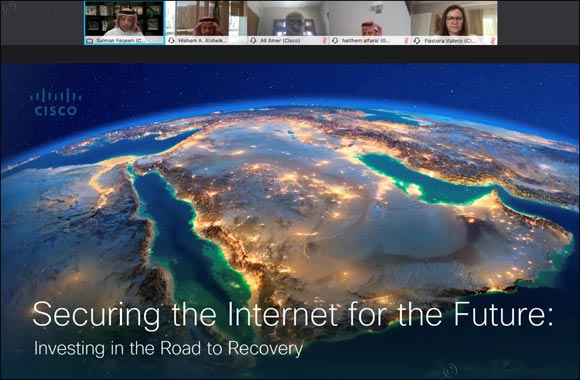Industry Roundtable Identifies Increased Investment and Co-Creation as Essential to Helping Meet the Kingdom’s Growing Digitization Demands
Kingdom of Saudi Arabia – 15 July 2020: During the virtual roundtable discussion hosted by Cisco, titled ‘Securing the Internet for the Future: Investing in the Road to Recovery’, telecommunication service providers and industry regulators explored key learnings from recent events and evaluated the capability to meet expected demands of future work and communication.
Attendees included Ali Amer – Managing Director, Service Provider Sales, Cisco MEA; Hisham Alsheikh, Deputy CEO of the e-Government Program (Yesser); Haithem Al-Faraj, Senior Vice President of STC’s Technology and Operations Unit; Pastora Valero – Vice President, Public Policy and Government Affairs, EMEAR for Cisco.
The discussion identified that while Saudi Arabia has performed particularly well in terms of facilitating the shift to digital, constant innovation and investment is required to sustain and increase the nation’s connectivity. Security was identified as another core tenant of digitization practices, with panelists agreeing that in today’s complex environment, networks must be designed to always be one step ahead of cyberthreats.
“In Saudi Arabia, investment in national infrastructure has proved critical to enabling more secure, adaptable and connected environments. Our focus moving forward has to be ensuring that we are always thinking about how we can further future-proof the economy by investing in digitization. The Kingdom has paved the way in areas such as remote learning, e-health and e-Government. Our shared challenge is to now ensure that we are further accelerating development to bridge the digital divide and make services available to all,” said Ali Amer, Managing Director, Service Provider Sales, Cisco Middle East and Africa.
Panel discussion participants also advocated for regulations which carefully strike a balance between managing data concerns with promoting a culture of constant evolvement and innovation. The panelists concluded that as the digital economy continues to expand, regulators, service providers and technological facilitator must continue to have an open dialogue and shared commitment to enable secure and scalable digitization in the Kingdom.
Hisham Alsheikh, Deputy CEO of the e-Government Program (Yesser) added: “The coronavirus pandemic made it necessary for everyone to adopt digitization methods, during a time in which safety measures called for residents to stay at home and work remotely. During this time, the e-Government Program ensured that users would have easy access to government services. This would not have been made possible without the work and early coordination between the responsible government agencies and technical service providers who each played an important role in maintaining business continuity.”
Alsheikh also stressed the necessity of identifying the needs of users and developing digital services to meet such demand, in addition to communicating with end-users to raise awareness of the services available and their benefits.
As digital transformation continues to play a critical role in enabling more secure, adaptable, and connected working environments, recent events have shed light on key areas for improvement to help ensure continuity and aid growth, for local enterprise and individuals alike.
Key factors expected to influence network capabilities, according to Cisco’s Annual Internet Report:
1. Growth in the number of Internet users from 19.6 million in 2018 to 27.6 million in 2023
2. More devices and connections from 3.3 devices and connections per person in 2018 to 5.5 in 2023
3. Faster broadband speeds from 20.2 Mbps in 2018 to 65.2 Mbps in 2023 as demand rises for faster streaming, filesharing, video calling and gaming
4. Faster mobile speeds from 10.7 Mbps in 2018 to 43.6 Mbps by 2023
Each of Cisco’s projections point towards a life which will be spent increasingly online, with expectations for faster connectivity and a reliance on more agile forms of communicating expected to rise.
Engineer Haithem Al-Faraj, Senior Vice President of STC’s Technology and Operations Unit, said: “Since 2016, investing in digital transformation has been a major focus for STC, through investments made in infrastructure and expanding frequencies. This meant that even before the pandemic, with significant growth in network traffic over the past few months, Saudi Telecom Company managed to contain the increased volume of traffic. In addition, over 70% of the improvements that we made were towards facilitating remote operating activities, which enabled our teams to maintain network stability. Furthermore, STC continues to invest in infrastructure and the introduction of 5G technology, as well as the development of the Saudi youth, to support our company’s digital transformation strategy and various services. In the coming years, Internet infrastructure will be as important in supporting the digital economy as electricity and water.”
“Rather than being complacent, we must further accelerate investments in areas such as 5G, Wi-Fi 6 and cloud, which will prove more crucial than ever as the digital economy continues to expand. Whether regulator, service provider or technological facilitator, we must all align, have an open dialogue and shared commitment to championing digitization in Saudi Arabia,” said Salman Faqeeh, Managing Director, Cisco Saudi Arabia.



